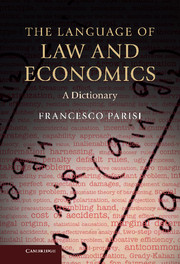U
Published online by Cambridge University Press: 04 August 2017
Summary
Ugly princess: the protection of the weaker contractual party against the opportunistic behavior of his or her stronger counterpart may require contractual safeguards. Law and economics and new institutional economics scholars have explored the role of alternative contractual solutions that extend beyond the standard contractual agreement to correct for problems of opportunistic behavior (Williamson, 1983; Baumol, 1986). The idea of a “hostage” has been used in this literature to refer to an atypical bonding mechanism (Kronman, 1985; Williamson, 1985; Baumol, 1986). A hostage is a bonding instrument characterized by the fact that it is of value to the promisor (the hostage giver), but of little or no value to the promisee (the hostage taker) or to society in general. This characteristic distinguishes hostages from collateral (which is, generally, equally valued by the two parties). Williamson (1983) explains this essential feature of a hostage with the “ugly princess” analogy. When a king is under siege and needs to give a hostage, he gives away the uglier of his two daughters. This action makes the hostage takers less apt simply to run away with the hostage. In a contractual context, when a promisee offers a hostage-type bonding mechanism, it is similarly important that he provides an unattractive hostage, to avoid opportunism by his promisee. For example, individuals who invest in firm-specific specialized human capital often will require some bonding (e.g., golden parachutes) in order to guard against the risk of exploitation by their employers (Baumol, 1986). However, the employer should be careful not to offer anything too attractive in the way of bonding to his or her worker, or else the worker may find a way to trigger the termination condition and run away with it. One of the difficulties in applying the ugly princess concept in the design of hostages is that, in some cases, hostages do not have an objective market value, and it may be difficult for the promisee to ascertain the actual value of the hostage to the promisor. See also hostages.
- Type
- Chapter
- Information
- The Language of Law and EconomicsA Dictionary, pp. 306 - 310Publisher: Cambridge University PressPrint publication year: 2013



